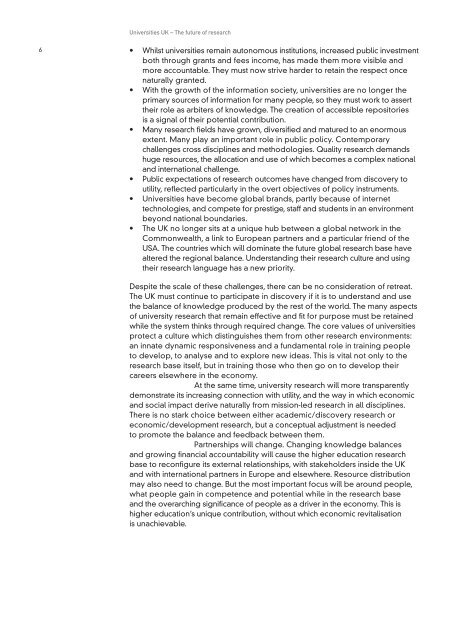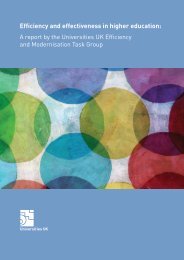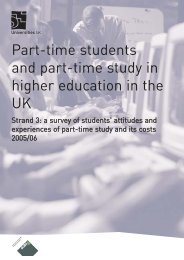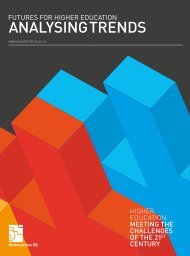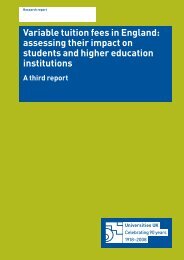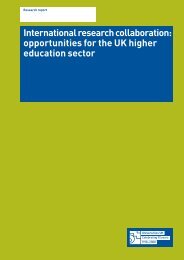The future of research - Universities UK
The future of research - Universities UK
The future of research - Universities UK
You also want an ePaper? Increase the reach of your titles
YUMPU automatically turns print PDFs into web optimized ePapers that Google loves.
<strong>Universities</strong> <strong>UK</strong> – <strong>The</strong> <strong>future</strong> <strong>of</strong> <strong>research</strong><br />
6<br />
• Whilst universities remain autonomous institutions, increased public investment<br />
both through grants and fees income, has made them more visible and<br />
more accountable. <strong>The</strong>y must now strive harder to retain the respect once<br />
naturally granted.<br />
• With the growth <strong>of</strong> the information society, universities are no longer the<br />
primary sources <strong>of</strong> information for many people, so they must work to assert<br />
their role as arbiters <strong>of</strong> knowledge. <strong>The</strong> creation <strong>of</strong> accessible repositories<br />
is a signal <strong>of</strong> their potential contribution.<br />
• Many <strong>research</strong> fields have grown, diversified and matured to an enormous<br />
extent. Many play an important role in public policy. Contemporary<br />
challenges cross disciplines and methodologies. Quality <strong>research</strong> demands<br />
huge resources, the allocation and use <strong>of</strong> which becomes a complex national<br />
and international challenge.<br />
• Public expectations <strong>of</strong> <strong>research</strong> outcomes have changed from discovery to<br />
utility, reflected particularly in the overt objectives <strong>of</strong> policy instruments.<br />
• <strong>Universities</strong> have become global brands, partly because <strong>of</strong> internet<br />
technologies, and compete for prestige, staff and students in an environment<br />
beyond national boundaries.<br />
• <strong>The</strong> <strong>UK</strong> no longer sits at a unique hub between a global network in the<br />
Commonwealth, a link to European partners and a particular friend <strong>of</strong> the<br />
USA. <strong>The</strong> countries which will dominate the <strong>future</strong> global <strong>research</strong> base have<br />
altered the regional balance. Understanding their <strong>research</strong> culture and using<br />
their <strong>research</strong> language has a new priority.<br />
Despite the scale <strong>of</strong> these challenges, there can be no consideration <strong>of</strong> retreat.<br />
<strong>The</strong> <strong>UK</strong> must continue to participate in discovery if it is to understand and use<br />
the balance <strong>of</strong> knowledge produced by the rest <strong>of</strong> the world. <strong>The</strong> many aspects<br />
<strong>of</strong> university <strong>research</strong> that remain effective and fit for purpose must be retained<br />
while the system thinks through required change. <strong>The</strong> core values <strong>of</strong> universities<br />
protect a culture which distinguishes them from other <strong>research</strong> environments:<br />
an innate dynamic responsiveness and a fundamental role in training people<br />
to develop, to analyse and to explore new ideas. This is vital not only to the<br />
<strong>research</strong> base itself, but in training those who then go on to develop their<br />
careers elsewhere in the economy.<br />
At the same time, university <strong>research</strong> will more transparently<br />
demonstrate its increasing connection with utility, and the way in which economic<br />
and social impact derive naturally from mission-led <strong>research</strong> in all disciplines.<br />
<strong>The</strong>re is no stark choice between either academic/discovery <strong>research</strong> or<br />
economic/development <strong>research</strong>, but a conceptual adjustment is needed<br />
to promote the balance and feedback between them.<br />
Partnerships will change. Changing knowledge balances<br />
and growing financial accountability will cause the higher education <strong>research</strong><br />
base to reconfigure its external relationships, with stakeholders inside the <strong>UK</strong><br />
and with international partners in Europe and elsewhere. Resource distribution<br />
may also need to change. But the most important focus will be around people,<br />
what people gain in competence and potential while in the <strong>research</strong> base<br />
and the overarching significance <strong>of</strong> people as a driver in the economy. This is<br />
higher education’s unique contribution, without which economic revitalisation<br />
is unachievable.


